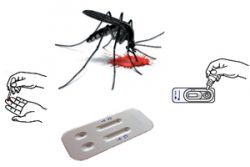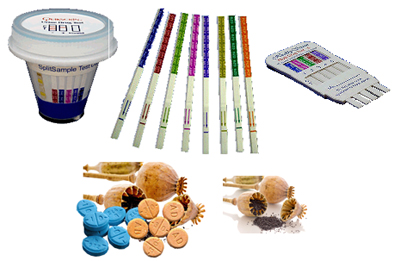Dengue NS1 Ag Rapid Test
About Dengue
Duo Dengue NS1 + IgG/IgM Rapid Test
Dengue viruses are transmitted in nature by day-biting Stegemvia family principally Aedes aegypti and Aedes albopicturs mosquitoes. Dengue fever virus belongs to the group Flavi virus, which is widely distributed in the epidemic and endemic areas throughout tropical and subtropical regions of the world. More than 2.5 billion people living in the areas of tropical Asia, Australia, Africa and the Americas are at risk for dengue infection. Dengue fever virus is considered the most important in terms of morbidity, mortality and economics cost with an estimated about 100 million cases of dengue fever and 250,000 cases of life-threatening dengue hemorrhagic fever occur annually on a worldwide basis.
Intended Use
The Dengue NS1 Rapid Test is a immunochromatographic assay for the qualitative detection of Dengue of Dengue NS1Atigen in serum, plasma or whole blood specimens. The test is intended for professionals use.
NS1 is a glycoprotein that is present in high concentration in the bloodstream during the early clinical phase of the disease. NS1antigen was found circulating from the first day after the onset of fever up to day 9, once the clinical phase of the disease is over. The NS1 protein could be detected in the presence of immunoglobulin M antibodies. NS1 circulation levers varied among individuals during the course of the disease, ranging from several nanograms per milliliter (ng/ml) to several micrograms per milliliter (ug/ml) of serum.
Dengue IgG/IgM rapid test
Intended Use
The Dengue IgG/IgM Rapid Test is a immunochromatographic assay for the qualitative and differential detection of IgG and IgM to DENV 1, 2, 3&4 in serum, plasma or whole blood specimens. The test is intended for professionals use.
There are four know serotypes of dengue. Symptoms of dengue fever includes high fever, headache, muscle pain and skin rash. The complications often associated with this infection are dengue hemorrhagic fever or dengue shock syndrome. The immune response to this virus includes the production of IgM antibodies by the 5th day of symptoms, which remain in the circulatory system for 30-60 days. IgG antibodies appear by the 14th day of infection and persist for life. A secondary infection often results in high fever and, in many cases, initiates hemorrhagic events and circulatory failure. A secondary infection also induces an IgM antibody response after 20 days of infection and IgG antibodies rise within 1-2 days after the onset of symptoms. Therefore patients with secondary infections will have a positive IgG result usually with a positive IgM result as well.
012-2986138
admin@sunlifemedic.com





